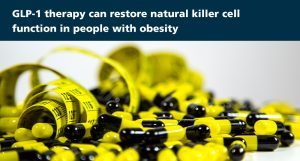A study by Barra et al. suggests that long-acting glucagon-like peptide-1 (GLP-1) analogues, which are used as a treatment for obesity, may help to restore natural killer (NK) cell function in people with obesity (PWO). In a study of 20 PWO, GLP-1 therapy was found to improve NK cell function, as measured by cytotoxicity and interferon-Îł/granzyme B production, and increase a CD98-mTOR-glycolysis metabolic axis critical for NK cell cytokine production. These findings suggest that GLP-1 therapy could potentially contribute to the overall benefits of this class of medication beyond just weight loss.
Source:Â https://doi.org/10.1002/oby.23772




